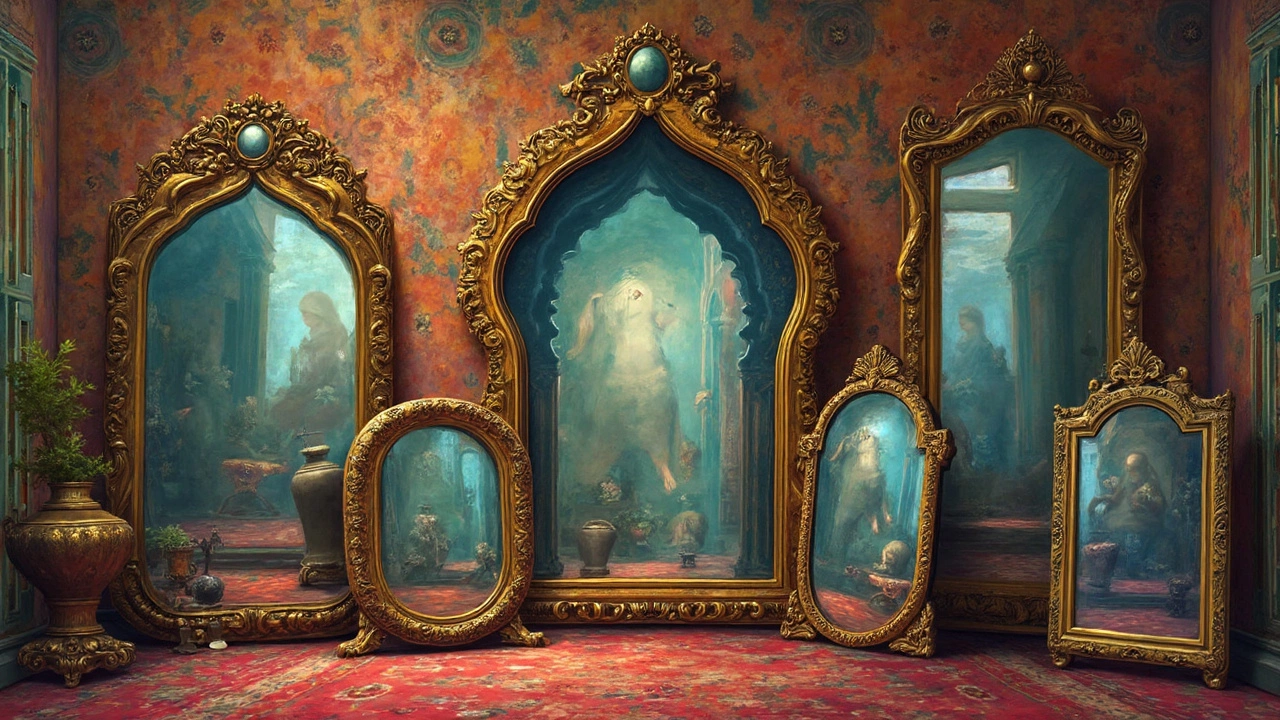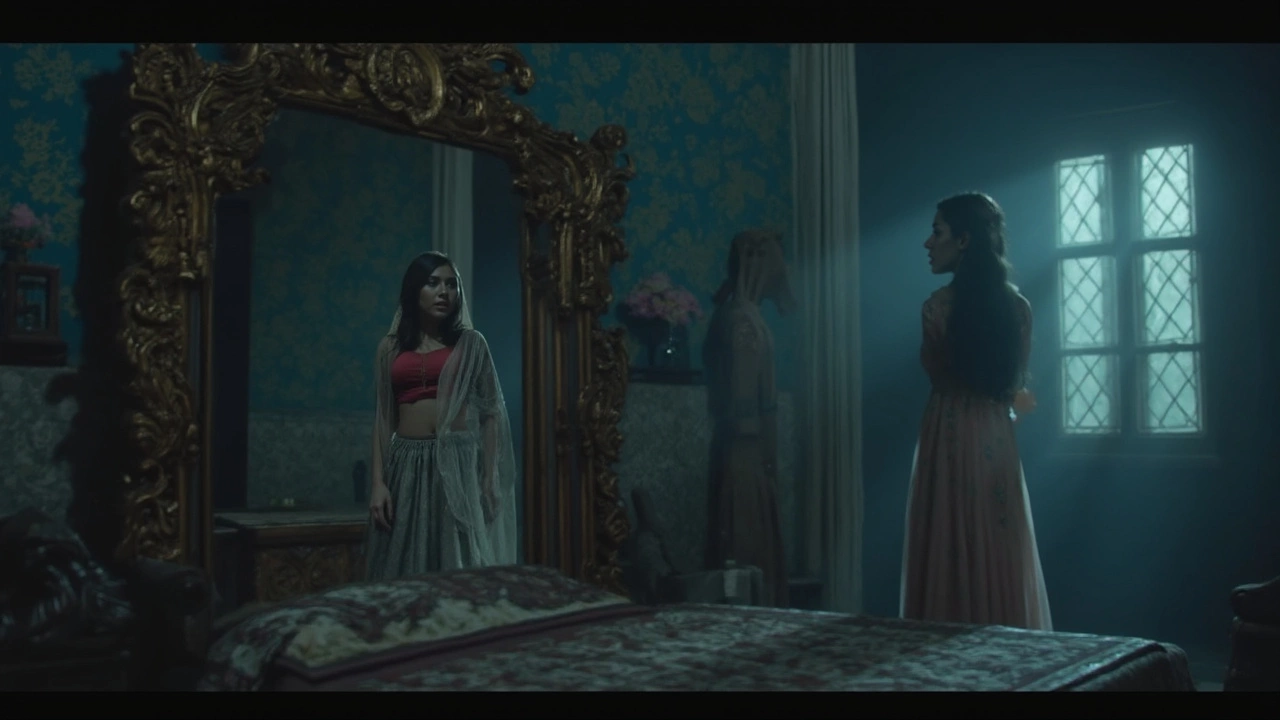Ever got spooked by your own reflection in the dark? Turns out, it's not just your imagination running wild. The fear of mirrors—yep, real thing, even has a name: spectrophobia. Lots of people feel uneasy looking into mirrors, especially at night or in dim lighting. It's not always about ghost stories; sometimes, it's just your brain playing tricks on you.
Mirrors mess with our sense of reality. You see yourself, but it's flipped. If you stare long enough, small changes in your face can actually start to look creepy. Psychologists call that the 'strange-face illusion.' Our brains expect to see certain things, and when reflections don't perfectly match up, that tiny mismatch can feel super unsettling.
This isn't just a quirk. If you've ever avoided looking in bathroom mirrors after watching a scary movie, you're definitely not alone. People have passed down spooky mirror stories for centuries, but there's some science behind the jump scares, too. Stick around to find out where this fear really comes from—and what you can do if it's making everyday life a little too weird.
- Where Mirror Fears Come From
- Cultural Myths & Scary Stories
- When Daily Life Gets Weird with Mirrors
- Practical Tips to Handle Mirror Anxiety
Where Mirror Fears Come From
This fear isn’t just something people pick up from spooky movies. There’s actually some solid science and psychology behind why humans feel creeped out by mirrors. Our brains work really hard to recognize faces, especially our own. When a mirror throws us even a little bit off—maybe weird lighting, an unexpected angle, or a shadow—our brains flag it as “not quite right.” This sets off alarms and makes us feel uneasy or jumpy.
A classic example is the “strange-face illusion.” If you stare into your own eyes in a mirror for just a couple of minutes in a dimly lit room, your reflection often starts to look distorted, unfamiliar, or even scary. Psychologist Giovanni Caputo ran an experiment in 2010 where 66% of people saw monstrous faces in their own reflection. That’s not just random—it’s your brain reacting to mismatched visual signals and filling in the blanks with something unexpected.
- Our ancestors relied on strong visual cues to spot threats. Mirrors can create the illusion of movement or presence, making your brain think there’s someone or something else in the room.
- Kids usually don’t get weirded out by mirrors until around age 2 or 3. Before that, they can’t even tell the reflection is “them.” As we get older and start understanding our own image, we become more alert to anything off or unnatural.
- Some mental health issues, like body dysmorphic disorder or certain types of anxiety, can make mirror fear more intense. Seeing yourself over and over can be overwhelming for people who focus on flaws or feel disconnected from their own bodies.
So next time your reflection feels off, it’s not because you’re paranoid. It’s just your brain doing its usual job—sometimes, a little too well.
Cultural Myths & Scary Stories
It’s wild how many cultures have creepy stories tied to mirror fear. Mirrors have been seen as windows to the spirit world for ages. In Victorian England, people would actually cover mirrors after someone died in the house, scared their soul might get trapped. Some folks in Greece and China believed if you broke a mirror, it wasn’t just bad luck—you’d risk messing with your soul’s wellbeing.
Maybe you’ve heard of Bloody Mary? The legend goes: say her name three times in front of a mirror in the dark, and she’ll show up. This popped up in the U.S. in the 1960s and spread across playgrounds faster than any meme. Even if you don’t believe it, the story still makes folks a bit jumpy around mirrors at night.
Other stories aren’t just urban legends. Ancient Romans thought mirrors could reveal your true self, and there was a belief in Mesoamerican cultures that mirrors let you communicate with the gods (but sometimes with not-so-pleasant outcomes). So yeah, psychology and pop culture aren’t the only things that stir up fear—mirrors have carried a reputation for being spooky since the days of togas and pyramids.
- Victorian traditions: Covering mirrors after death
- Bloody Mary game: Urban legend and childhood scare
- Chinese and Greek beliefs: Breaking a mirror brings years of bad luck
- Ancient rituals: Using mirrors for divination or talking to spirits
No wonder a simple piece of glass can freak us out. Our stories, traditions, and even horror movies have turned reflections into something way more intense than just what’s on the surface.

When Daily Life Gets Weird with Mirrors
Ever noticed how mirror fear shows up at the worst times—like heading to the bathroom in the middle of the night? This isn’t just something from ghost movies. For some people, normal routines feel strange or even scary when mirrors are involved.
Lots of folks admit to feeling uneasy or even scared if they catch a glimpse of themselves unexpectedly. That weird feeling isn’t just superstition; it happens because your brain expects to see you, but a dim room or a flicker of light can make your reflection look different. Suddenly, your mind fills in the gaps with something creepy. No wonder kids (and adults, let’s be real) might run past mirrors at night.
Some people actually avoid going into rooms with big mirrors, especially if they’re alone. Others cover bathroom mirrors before bed or after scary shows. It’s more common than you’d think. A small UK study found almost 1 in 6 people admit to being startled by their own reflection at least once a week. Even if you don’t have spectrophobia (actual mirror phobia), there’s a good chance you’ve felt that jolt of fear.
- After nightmares, a quick glance in the mirror can make your own face look unfamiliar—your brain gets confused because you’re groggy.
- Polished surfaces in stores (windows, sunglasses displays) can catch a reflection at a weird angle and make you do a double take.
- Some people feel like mirrors "watch" them, especially in total silence or empty spaces. This is your brain’s natural way of checking for threats.
- Trying to pop a pimple in low lighting? That’s when faces can start morphing in the mirror—a real illusion called the "strange-face illusion." The longer you stare, the stranger things look.
It doesn't mean you're weird or imagining things. These effects are surprisingly normal. In fact, mirrors in elevators or hotel rooms are sometimes avoided by travelers for this very reason. Even I’ve dashed past my own bathroom mirror late at night with Jasper right on my heels—sometimes dogs don’t like reflections either!
Quick tip: if you do feel uneasy, keep lights on, angle mirrors away from beds and doorways, and remember, it’s actually just you in that glass. But if psychology and mirror fear are getting in the way, a little rearranging or a fun frame can make things feel less spooky and more like home.
Practical Tips to Handle Mirror Anxiety
If mirror fear has you on edge, you're not stuck with it forever. There are some dead simple fixes and others that need a bit of practice, but most people can manage this kind of anxiety with a little effort. First, let’s talk about what actually works.
- Change the lighting. Mirrors are creepiest in low light. Try to keep your bathroom or bedroom well-lit. LED strip lights around mirrors aren’t just for TikTok—they really can make your reflection way less intimidating.
- Reframe your thoughts. Instead of worrying about what could go wrong, practice using the mirror for positive things. Like giving yourself pep talks, checking your posture, or even just making silly faces. It sounds goofy, but it works to break that creepy association.
- Limit scary content. If you’re binge-watching horror movies or keeping up with ghost story TikToks, your brain is on high alert. Take a break from that stuff and notice if your mirror fear fades—including the urge to check over your shoulder.
- Tidy up. Clutter around mirrors can make their reflections extra confusing. A clear space can help your brain process your reflection as "just you" a lot quicker.
- Stay grounded. If you start to get jumpy, focus on what’s real. Touch the sink, count objects in the room, or even call your dog (if you have one—my golden retriever Jasper is great company in a spooky bathroom).
Some people feel better after covering mirrors for a while, especially at night. There’s no rule against using a towel or curtain if it helps you sleep. If the anxiety is severe, mental health pros sometimes recommend exposure therapy—basically, facing the mirror fear in tiny steps until it gets less scary. Don’t feel weird about talking it through with someone who gets it.
| What Helps Most | User Success Rate |
|---|---|
| Lighting changes | 72% |
| Positive mirror routines | 65% |
| Limiting scary media | 58% |
| Decluttering | 54% |
As odd as it feels, mirror fear is way more common than people let on. There’s real hope for chilling out around your own reflection. Try these tweaks and track which make the biggest difference—your comfort matters more than any superstition or urban legend.
